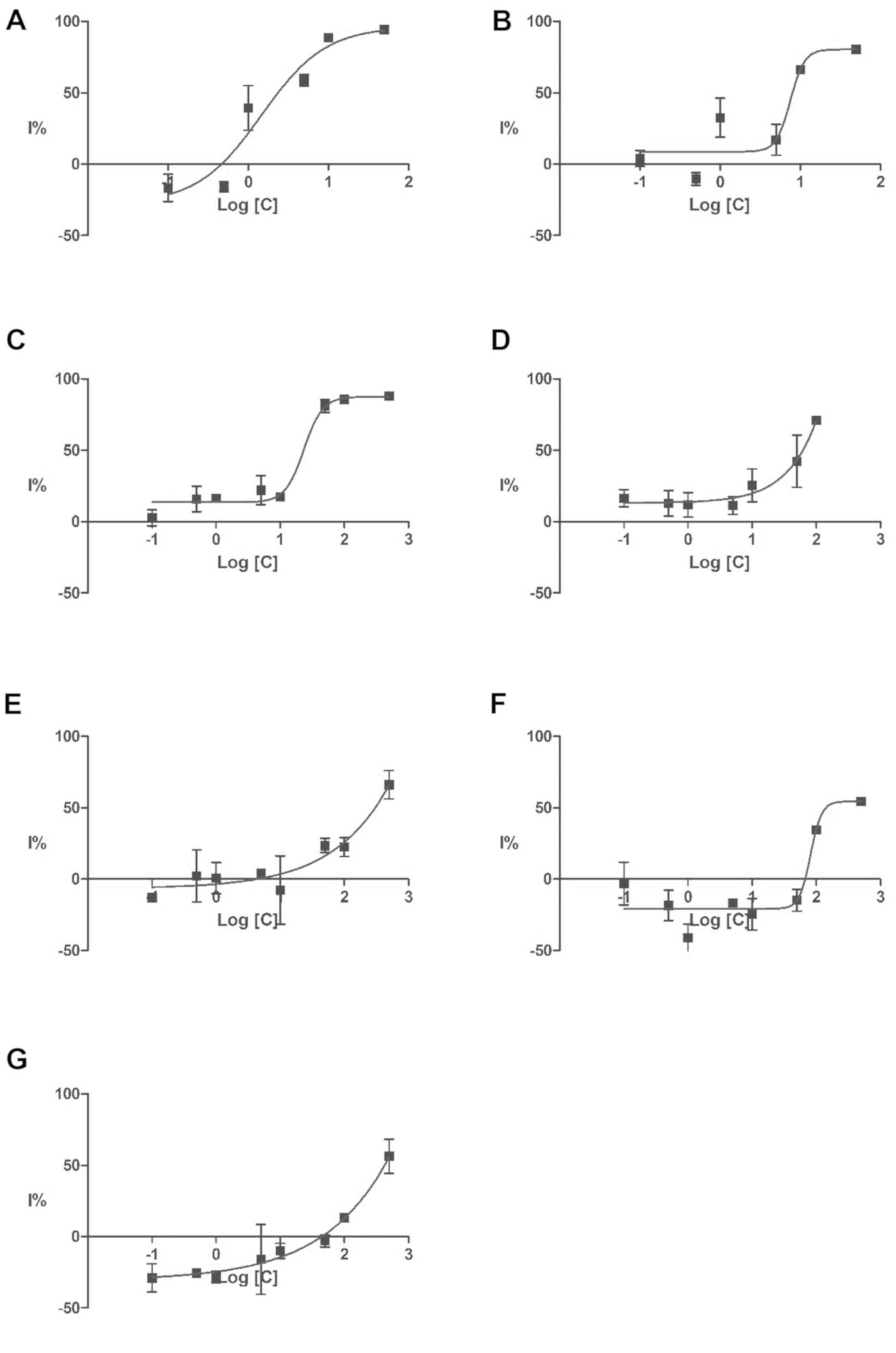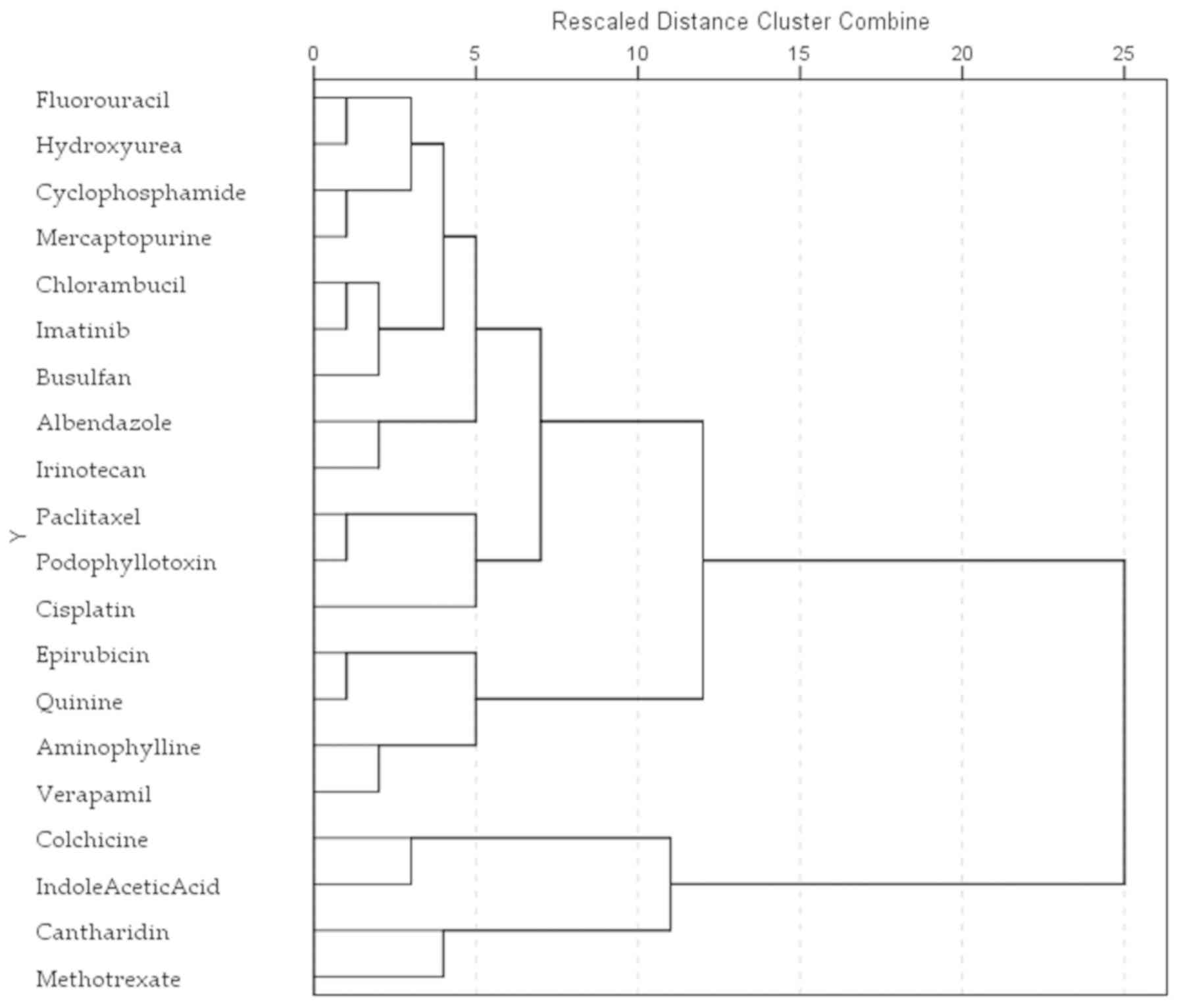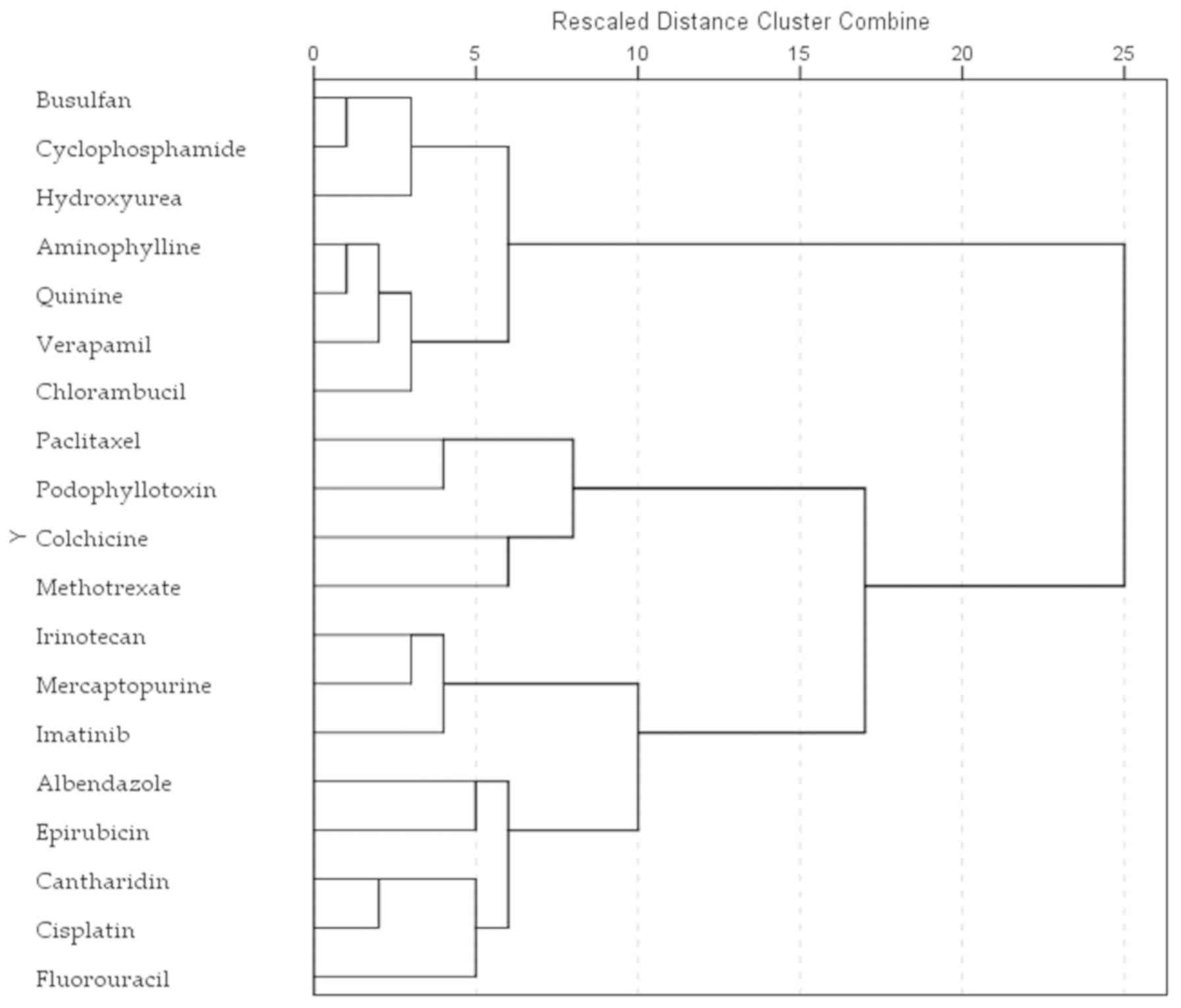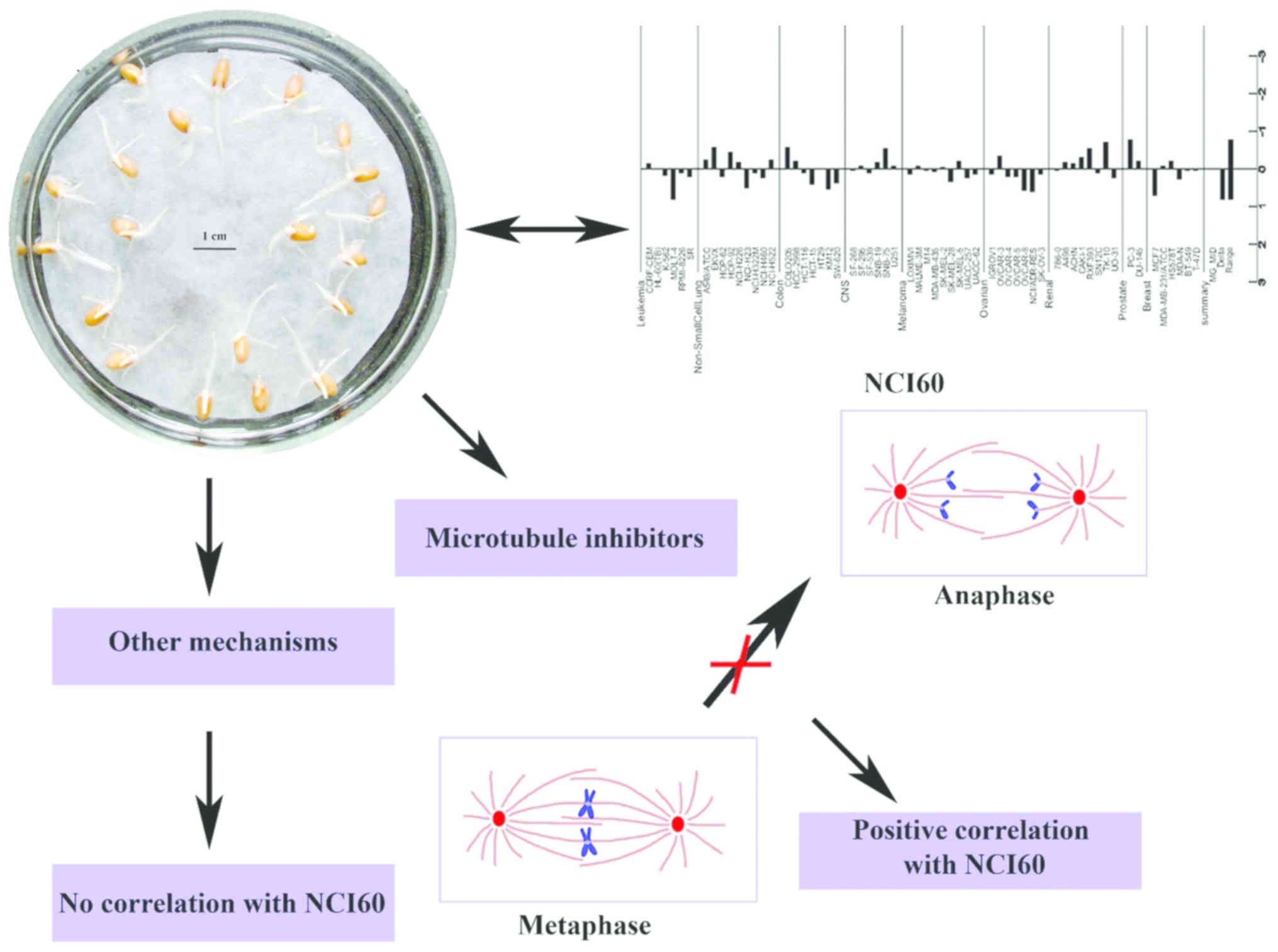|
1
|
Festing S and Wilkinson R: The ethics of
animal research. Talking point on the use of animals in scientific
research. EMBO Rep. 8:526–530. 2007. View Article : Google Scholar : PubMed/NCBI
|
|
2
|
Mak IWY, Evaniew N and Ghert M: Lost in
translation: Animal models and clinical trials in cancer treatment.
Am J Transl Res. 6:114–118. 2014.PubMed/NCBI
|
|
3
|
North M and Vulpe CD: Functional
toxicogenomics: Mechanism-centered toxicology. Int J Mol Sci.
11:4796–4813. 2010. View Article : Google Scholar : PubMed/NCBI
|
|
4
|
Gatehouse D: Bacterial mutagenicity
assays: Test methods. Genetic Toxicology: Principles and Methods.
Parry JM and Parry EM: Springer; New York, New York, NY: pp. 21–34.
2012, View Article : Google Scholar
|
|
5
|
Bagur-González MG, Estepa-Molina C,
Martín-Peinado F and Morales-Ruano S: Toxicity assessment using
Lactuca sativa L. bioassay of the metal(loid)s As, Cu, Mn, Pb and
Zn in soluble-in-water saturated soil extracts from an abandoned
mining site. J Soils Sediments. 11:281–289. 2011. View Article : Google Scholar
|
|
6
|
Czerniawska-Kusza I, Ciesielczuk T, Kusza
G and Cichoń A: Comparison of the Phytotoxkit microbiotest and
chemical variables for toxicity evaluation of sediments. Environ
Toxicol. 21:367–372. 2006. View Article : Google Scholar : PubMed/NCBI
|
|
7
|
Sánchez-Meza J, Pacheco-Salazar V,
Pavón-Silva T, Guiérrez-García V, Avila-González CJ and
Guerrero-García P: Toxicity assessment of a complex industrial
wastewater using aquatic and terrestrial bioassays Daphnia pulex
and Lactuca sativa. J Env Sci Heal A Tox Hazard Subst Env Eng.
42:1425–1431. 2007. View Article : Google Scholar
|
|
8
|
Pandard P, Devillers J, Charissou AM,
Poulsen V, Jourdain MJ, Férard JF, Grand C and Bispo A: Selecting a
battery of bioassays for ecotoxicological characterization of
wastes. Sci Total Environ. 363:114–125. 2006. View Article : Google Scholar : PubMed/NCBI
|
|
9
|
Guțu CM, Olaru OT, Purdel CN, Ilie M and
Diacu E: Phytotoxicity of inorganic arsenic assessed by Triticum
test. Rev Chim. 66:333–335. 2015.
|
|
10
|
Ahmed FAW: Cytotoxic and genotoxic potency
screening of WIDE-SPEC pesticide on Allium cepa L. root meristem
cells. J Nat Sci Res. 4:100–108. 2014.
|
|
11
|
Dragoeva A, Koleva V, Hasanova N and
Slanev S: Cytotoxic and genotoxic effects of diphenyl-ether
herbicide GOAL (Oxyfluorfen) using the Allium cepa test. Res J
Mutagen. 2:1–9. 2012. View Article : Google Scholar
|
|
12
|
Șeremet OC, Olaru OT, Ilie M, Negres S and
Balalau D: Phytotoxicity assessment of certain phytochemical
products containing pyrrolizidine alkaloids. Acta Med Marisiensis.
59:250–253. 2013. View Article : Google Scholar
|
|
13
|
Lee WM, An YJ, Yoon H and Kweon HS:
Toxicity and bioavailability of copper nanoparticles to the
terrestrial plants mung bean (Phaseolus radiatus) and wheat
(Triticum aestivum): Plant agar test for water-insoluble
nanoparticles. Environ Toxicol Chem. 27:1915–1921. 2008. View Article : Google Scholar : PubMed/NCBI
|
|
14
|
Ashrafi ZY, Sadeghi S and Mashhadi HR:
Inhibitive effects of barley (Hordeum vulgare) on germination and
growth of seedling quack grass (Agropyrum repens). Icel Agric Sci.
22:37–43. 2009.
|
|
15
|
Yuet Ping K, Darah I, Yusuf UK, Yeng C and
Sasidharan S: Genotoxicity of Euphorbia hirta: An Allium cepa
assay. Molecules. 17:7782–7791. 2012. View Article : Google Scholar : PubMed/NCBI
|
|
16
|
Pawlowski Â, Kaltchuk-Santos E, Zini CA,
Caramão EB and Soares GLG: Essential oils of Schinus
terebinthifolius and S. molle (Anacardiaceae): Mitodepressive and
aneugenic inducers in onion and lettuce root meristems. S Afr J
Bot. 80:96–103. 2012. View Article : Google Scholar
|
|
17
|
Diaz Napal GN and Palacios SM:
Phytotoxicity of secondary metabolites isolated from Flourensia
oolepis S.F.Blake. Chem Biodivers. 10:1295–1304. 2013. View Article : Google Scholar : PubMed/NCBI
|
|
18
|
Furmanowa M, Guzewska J and Bełdowska B:
Mutagenic effects of aqueous extracts of Symphytum officinale L.
and of its alkaloidal fractions. J Appl Toxicol. 3:127–130. 1983.
View Article : Google Scholar : PubMed/NCBI
|
|
19
|
Zasada IA, Klassen W, Meyer SL, Codallo M
and Abdul-Baki AA: Velvetbean (Mucuna pruriens) extracts: Impact on
Meloidogyne incognita survival and on Lycopersicon esculentum and
Lactuca sativa germination and growth. Pest Manag Sci.
62:1122–1127. 2006. View
Article : Google Scholar : PubMed/NCBI
|
|
20
|
Andrade-Vieira LF, Botelho CM, Laviola BG,
Palmieri MJ and Praça-Fontes MM: Effects of Jatropha curcas oil in
Lactuca sativa root tip bioassays. An Acad Bras Cienc. 86:373–382.
2014. View Article : Google Scholar : PubMed/NCBI
|
|
21
|
Stampoulis D, Sinha SK and White JC:
Assay-dependent phytotoxicity of nanoparticles to plants. Environ
Sci Technol. 43:9473–9479. 2009. View Article : Google Scholar : PubMed/NCBI
|
|
22
|
Jitǎreanu A, Pǎdureanu S, Tǎtǎrîngǎ G,
Tuchilus GC and Stǎnescu U: Evaluation of phytotoxic and mutagenic
effects of some cinnamic acid derivatives using the Triticum test.
Turk J Biol. 37:748–756. 2013. View Article : Google Scholar
|
|
23
|
Radić S, Stipaničev D, Vujcić V, Rajcić
MM, Širac S and Pevalek-Kozlina B: The evaluation of surface and
wastewater genotoxicity using the Allium cepa test. Sci Total
Environ. 408:1228–1233. 2010. View Article : Google Scholar
|
|
24
|
Beemster GTS and Baskin TI: Analysis of
cell division and elongation underlying the developmental
acceleration of root growth in Arabidopsis thaliana. Plant Physiol.
116:1515–1526. 1998. View Article : Google Scholar : PubMed/NCBI
|
|
25
|
Komlodi-Pasztor E, Sackett DL and Fojo AT:
Inhibitors targeting mitosis: Tales of how great drugs against a
promising target were brought down by a flawed rationale. Clin
Cancer Res. 18:51–63. 2012. View Article : Google Scholar : PubMed/NCBI
|
|
26
|
Chabner BA: NCI-60 Cell Line Screening: A
radical departure in its time. Natl Cancer Inst. 108:pii: djv388.
2016. View Article : Google Scholar
|
|
27
|
Devinyak O, Havrylyuk D, Zimenkovsky B and
Lesyk R: Computational search for possible mechanisms of
4-thia-zolidinones anticancer activity: The power of visualization.
Mol Inform. 33:216–229. 2014. View Article : Google Scholar : PubMed/NCBI
|
|
28
|
Soriga SG, Plesu V, Marton A, Bonet-Ruiz
J, Marton GI and Iancu P: Small computer clusters for molecular
modelling. Rev Chim. 65:960–965. 2014.
|
|
29
|
Khan SA, Virtanen S, Kallioniemi OP,
Wennerberg K, Poso A and Kaski S: Identification of structural
features in chemicals associated with cancer drug response: A
systematic data-driven analysis. Bioinformatics. 30:i497–i504.
2014. View Article : Google Scholar : PubMed/NCBI
|
|
30
|
Nitulescu GM, Soriga SG, Socea LI, Olaru
OT and Plesu V: Structure-activity relationships and
chemoinformatic analysis of the anticancer profile of an
aminopyrazole derivative. Rev Chim. 67:162–165. 2016.
|
|
31
|
Nitulescu GM, Iancu G, Nitulescu G, Iancu
RC, Bogdanici C and Vasile D: Brave new hope for breast cancer:
Aminopyrazole derivates between rational design and clinical
efficacy. Rev Chim. 68:754–757. 2017.
|
|
32
|
Fu SF, Wei JY, Chen HW, Liu YY, Lu HY and
Chou JY: Indole-3-acetic acid: A widespread physiological code in
interactions of fungi with other organisms. Plant Signal Behav.
10:e1048052. 2015. View Article : Google Scholar : PubMed/NCBI
|
|
33
|
Nitulescu GM, Soriga SG, Socea LI, Olaru
OT and Plesu V: Structure-activity relationships and
chemoinformatic analysis of the anticancer profile of an
aminopyrazole derivative. Rev Chim. 67:162–165. 2016.
|
|
34
|
Lu Y, Chen J, Xiao M, Li W and Miller DD:
An overview of tubulin inhibitors that interact with the colchicine
binding site. Pharm Res. 29:2943–2971. 2012. View Article : Google Scholar : PubMed/NCBI
|
|
35
|
Papachristou M, Kastis GA, Stavrou PZ,
Xanthopoulos S, Furenlid LR, Datseris IE and Bouziotis P:
Radiolabeled metho-trexate as a diagnostic agent of inflammatory
target sites: A proof-of-concept study. Mol Med Rep. 17:2442–2448.
2018.
|
|
36
|
Giordano D, Reyneri A and Blandino M:
Folate distribution in barley (Hordeum vulgare L.), common wheat
(Triticum aestivum L.) and durum wheat (Triticum turgidum durum
Desf.) pearled fractions. J Sci Food Agric. 96:1709–1715. 2016.
View Article : Google Scholar
|
|
37
|
Gorelova V, Ambach L, Rébeillé F, Stove C
and Van Der Straeten D: Folates in plants: Research advances and
progressin crop biofortification. Front Chem. 5:212017. View Article : Google Scholar
|
|
38
|
Liu Y-P, Li L, Xu L, Dai E-N and Chen WD:
Cantharidin suppresses cell growth and migration, and activates
autophagy in human non-small cell lung cancer cells. Oncol Lett.
15:6527–6532. 2018.PubMed/NCBI
|
|
39
|
Bonness K, Aragon IV, Rutland B,
Ofori-Acquah S, Dean NM and Honkanen RE: Cantharidin-induced
mitotic arrest is associated with the formation of aberrant mitotic
spindles and lagging chromosomes resulting, in part, from the
suppression of PP2Aalpha. Mol Cancer Ther. 5:2727–2736. 2006.
View Article : Google Scholar : PubMed/NCBI
|
|
40
|
Sun Y, Jiang W, Lu W, Song M, Liu K, Chen
P, Chang A, Ling J, Chiao PJ, Hu Y, et al: Identification of
cisplatin sensitizers through high-throughput combinatorial
screening. Int J Oncol. 53:1237–1246. 2018.PubMed/NCBI
|
|
41
|
Dasari S and Tchounwou PB: Cisplatin in
cancer therapy: Molecular mechanisms of action. Eur J Pharmacol.
740:364–378. 2014. View Article : Google Scholar : PubMed/NCBI
|
|
42
|
Florea AM and Büsselberg D: Cisplatin as
an anti-tumor drug: Cellular mechanisms of activity, drug
resistance and induced side effects. Cancers (Basel). 3. pp.
1351–1371. 2011, View Article : Google Scholar
|
|
43
|
Pahontu E, Socea LI, Barbuceanu SF, Nou
Autor, Octavian-Tudorel Olaru, Aurelian Gulea and Bogdan Socea:
Synthesis, characterization and toxicity evaluation of Cu(II),
Mn(II), Co(II), Ni(II), Pd(II) complexes with ligand derived from
hydrazinecarbothioamide. Rev Chim. 69:2959–2963. 2018.
|
|
44
|
Nitulescu G, Nicorescu IM, Olaru OT,
Ungurianu A, Mihai DP, Zanfirescu A, Nitulescu GM and Margina D:
Molecular docking and screening studies of new natural sortase A
inhibitors. Int J Mol Sci. 18:182017. View Article : Google Scholar
|
|
45
|
Socea LI, Barbuceanu SF, Socea B, Draghici
C, Apostol TV, Pahontu EM and Olaru OT: New heterocyclic compounds
from 1,2,4-triazoles class with potential cytotoxic activity. Rev
Chim. 68:2503–2508. 2017.
|
|
46
|
Sakr MT, Khedr AM, Rashed MH and Mohamed
EM: In silico-based repositioning of phosphinothricin as a novel
technetium-99m imaging probe with potential anti-cancer activity.
Molecules. 23:pii: E496. 2018. View Article : Google Scholar
|


















